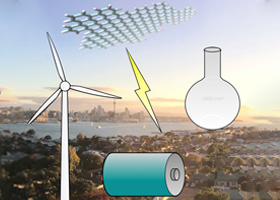- 3.2Impact Factor
- 7.3CiteScore
- 17 daysTime to First Decision
Advances in Materials for Electrochemical Energy Applications
This special issue belongs to the section “D1: Advanced Energy Materials“.
Special Issue Information
Dear Colleagues,
Sustainable and environmentally friendly energy storage and conversion technologies are essential to satisfy the dramatically increasing global energy demand and to reduce the dependence on non-renewable fossil fuels. The development of novel materials plays a key role in improving the properties and performance of devices in a wide range of electrochemical energy applications including batteries, supercapacitors, flow batteries, fuel cells, hydrogen storage, photocatalysis and thermal energy storage.
The aim of this Special Issue is to present the recent advances in materials used in all electrochemical forms of sustainable energy harvesting, conversion, storage and utilization, including but not limited to:
- Batteries;
- Supercapacitors;
- Flow batteries;
- Fuel cells;
- Electrocatalysis and electrocatalysts for energy conversion and storage;
- Photocatalysis and photocatalysts for water splitting;
- Hydrogen production and storage;
- Thermochemical, piezoelectric and thermoelectric materials and devices;
- Flexible, self-powered and integrated energy devices/systems.
It is our pleasure to invite you to submit a manuscript for this Special Issue. Full papers, communications and reviews are all welcome.
Dr. Claudio Mele
Guest Editor
Manuscript Submission Information
Manuscripts should be submitted online at www.mdpi.com by registering and logging in to this website. Once you are registered, click here to go to the submission form. Manuscripts can be submitted until the deadline. All submissions that pass pre-check are peer-reviewed. Accepted papers will be published continuously in the journal (as soon as accepted) and will be listed together on the special issue website. Research articles, review articles as well as short communications are invited. For planned papers, a title and short abstract (about 250 words) can be sent to the Editorial Office for assessment.
Submitted manuscripts should not have been published previously, nor be under consideration for publication elsewhere (except conference proceedings papers). All manuscripts are thoroughly refereed through a single-blind peer-review process. A guide for authors and other relevant information for submission of manuscripts is available on the Instructions for Authors page. Energies is an international peer-reviewed open access semimonthly journal published by MDPI.
Please visit the Instructions for Authors page before submitting a manuscript. The Article Processing Charge (APC) for publication in this open access journal is 2600 CHF (Swiss Francs). Submitted papers should be well formatted and use good English. Authors may use MDPI's English editing service prior to publication or during author revisions.
Keywords
- Batteries
- Supercapacitors
- Flow batteries
- Fuel cells
- Electrocatalyst
- Electrode materials
- Electrochemical energy
- Energy storage
- Energy conversion

Benefits of Publishing in a Special Issue
- Ease of navigation: Grouping papers by topic helps scholars navigate broad scope journals more efficiently.
- Greater discoverability: Special Issues support the reach and impact of scientific research. Articles in Special Issues are more discoverable and cited more frequently.
- Expansion of research network: Special Issues facilitate connections among authors, fostering scientific collaborations.
- External promotion: Articles in Special Issues are often promoted through the journal's social media, increasing their visibility.
- e-Book format: Special Issues with more than 10 articles can be published as dedicated e-books, ensuring wide and rapid dissemination.

